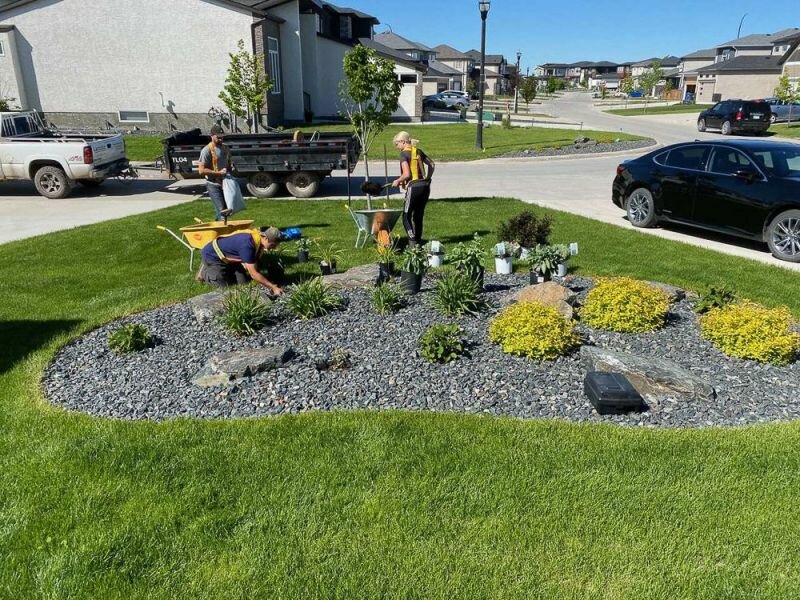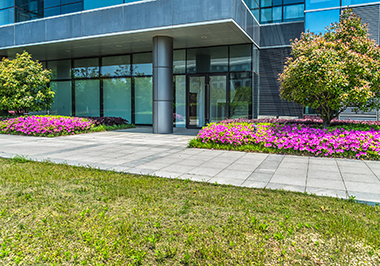Landscaping mistakes to avoid if you want a thriving garden
Comprehending the Comprehensive Range of Functions in Specialist Landscaping Services
The extensive scope of expert landscaping services incorporates a selection of basic aspects - landscaping. It includes landscape style concepts, plant selection, and hardscaping attributes. In addition, it addresses irrigation systems and upkeep strategies. Each element plays an important function in developing functional and cosmetically pleasing outside spaces. Comprehending how these elements function together can reveal much about the art and science of landscape design. The trip right into this elaborate field is simply starting.
Landscape Layout Concepts
Effective landscape style principles are crucial for producing unified outside spaces that boost both aesthetic charm and functionality (Learn More). These concepts direct the setup of components within the landscape, guaranteeing a cohesive visual experience. Trick parts consist of balance, which distributes aesthetic weight equally; percentage, which relates the size of numerous elements per various other and the room; and unity, which develops a sense of wholeness via constant motifs and materials

Plant Choice and Installment
In the domain name of professional landscaping, plant selection and installment play a vital function in accomplishing a prospering garden. Stressing native plant benefits, seasonal considerations, and the specific soil and sunlight requirements of each varieties ensures a lasting and cosmetically pleasing landscape. Careful planning in these areas not only improves biodiversity however also advertises lasting eco-friendly health and wellness.
Indigenous Plant Advantages
Why should homeowners consider indigenous plants for their landscape design tasks? Native plants provide countless advantages that boost both looks and ecological sustainability. They are well-adapted to regional environments, requiring less water and maintenance compared to non-native varieties. This durability decreases the need for chemical plant foods and chemicals, advertising a healthier community. In addition, indigenous plants provide habitat and food for regional wildlife, including pollinators, which can enhance biodiversity in residential locations. Their knowledge with local soil and weather additionally results in far better growth rates and longevity. By selecting native plants, property owners not only develop visually attractive landscapes but likewise add to eco-friendly conservation, making a positive effect on their regional atmosphere. Native plants represent a clever option for landscaping jobs.
Seasonal Plant Considerations
Property owners that have actually accepted indigenous plants in their landscaping can additionally improve their exterior areas by thinking about seasonal plant choices. By integrating plants that flourish in certain periods, they can produce aesthetically attractive and vibrant landscapes throughout the year. Spring might usher in vibrant flowers like tulips and daffodils, while summertime can showcase lavish vegetation and colorful perennials. Autumn presents a palette of warm tones with asters and goldenrods, while winter months can be highlighted with evergreens and decorative lawns for texture. Specialist landscaping companies usually recommend selecting plants that not only complement existing native types but additionally provide year-round interest and assistance regional wildlife. This thoughtful strategy to seasonal plant choice assures a continuously evolving and sustainable garden setting.
Dirt and Sunlight Demands
Effective landscaping depends upon comprehending the certain soil and sunlight demands of plants. Various types grow under varying problems, calling for a mindful analysis of both aspects throughout the choice process. Soil kinds, such as sandy, clay, or loamy, impact drainage, nutrition availability, and root advancement. In addition, pH degrees can affect plant health and wellness, demanding dirt screening to determine suitability. Sunshine needs differ significantly; some plants prosper in full sun, while others favor complete or partial color. A specialist landscaping company considers these components to guarantee peak development and visual allure. By aligning plant choices with the atmosphere's specific features, landscapes can accomplish sustainability, durability, and aesthetic harmony, ultimately resulting in successful plant establishment and long-term upkeep.
Hardscaping Attributes and Construction

While landscaping frequently stimulates pictures of rich greenery and vibrant blossoms, hardscaping functions play a crucial function in defining outdoor rooms. These aspects, that include outdoor patios, pathways, preserving wall surfaces, and decorative stonework, provide framework and functionality to yards and backyards. Hardscaping makes use of products such as concrete, rock, brick, and wood, permitting varied designs that match the natural landscape.
The building and construction of hardscaping attributes needs cautious planning and execution to ensure resilience and aesthetic charm. Specialists evaluate website problems, drainage, and spatial relationships to develop cohesive exterior settings. Proper installation techniques are crucial, as they prevent concerns like disintegration and shifting gradually.
Integrating hardscaping not only boosts the aesthetic rate of interest of a building but likewise promotes outdoor tasks, making it a basic aspect of detailed landscaping services. Inevitably, thoughtful hardscaping contributes to both the capability and elegance of outside areas.
Irrigation Solutions and Water Administration
Reliable irrigation systems and water monitoring are important components of professional landscaping, as they guarantee that plants receive the necessary hydration for ideal growth. These systems can vary from straightforward drip watering configurations to innovative computerized sprinkler systems, developed to meet the particular demands of varied landscapes. Correct water administration not only enhances water use, minimizing waste, yet also improves plant wellness and minimizes illness risks.
Landscaping experts assess various aspects, consisting of dirt type, plant varieties, and local environment, to establish tailored watering options. Furthermore, integrating rainwater harvesting strategies can better improve sustainability and effectiveness. Routine maintenance of watering systems is important to preserve capability and prevent leaks, which can lead to water loss and raised prices (Learn More). Ultimately, a properly designed irrigation system plays a critical function in protecting the visual allure of outside spaces while promoting eco-friendly stewardship within professional landscape design techniques
Grass Care and Maintenance Methods
Yard care and upkeep techniques are basic for accomplishing a lavish, healthy backyard that enhances the general landscape. These techniques incorporate various methods focused on promoting ideal growth and aesthetic appeal. Normal mowing is vital, as it urges thick, even growth while stopping weeds from developing. Furthermore, appropriate fertilization offers essential nutrients, with applications customized to the certain grass type and dirt problems.
Watering practices need to concentrate on deep, seldom irrigation to urge root growth, while aeration enhances dirt structure and advertises nutrient absorption. Insect and illness monitoring is likewise critical; recognizing problems early enables efficient treatments that decrease damages.
Overseeding can invigorate slim or damaged yards, enhancing thickness and color (landscaping services). By applying these targeted grass treatment strategies, landscaping specialists can guarantee that yards stay vivid and healthy throughout the seasons, substantially adding to the overall beauty of the residential or commercial property
Seasonal Landscape Care and Upkeep
As the periods change, correct landscape care comes to be important for keeping the wellness and elegance of exterior spaces. Each season presents special difficulties and demands. In springtime, landscape experts concentrate on pruning, planting, and fertilizing to encourage development. Summertime needs normal watering, weed control, and insect administration to safeguard recently developed plants.

Throughout the year, seasonal landscape maintenance guarantees that outdoor areas stay aesthetically attractive and healthy. Expert services can supply customized upkeep strategies that adapt to the specific requirements of each season, permitting residential or commercial property proprietors to appreciate vibrant landscapes year-round. Generally, seasonal treatment is an essential element of expert landscape design that promotes longevity and aesthetic value.

Lasting Landscape Design Practices
An expanding variety of homeowner are accepting sustainable landscaping methods to produce eco-friendly outside areas. These techniques concentrate on preserving resources, improving biodiversity, and minimizing environmental effect. Indigenous plants are commonly picked for their low tide needs and compatibility with neighborhood ecosystems, reducing the demand for chemical plant foods and pesticides. Rain yards and absorptive paving are used to handle stormwater overflow, promoting groundwater recharge and reducing erosion.
In addition, sustainable landscaping includes natural gardening methods that focus on soil health and wellness and advertise natural bug control. Reliable irrigation systems, such as drip watering and rainwater harvesting, help optimize water use. Furthermore, landscape designers increasingly advocate for the use of recycled materials, such as reclaimed timber and stones, to reduce waste. By taking on these lasting techniques, residential or commercial property proprietors not just add to ecological preservation however additionally develop visually pleasing environments that can prosper with very little maintenance.
Frequently Asked Questions
For how long Does a Landscape Design Job Typically Take to Full?
Usually, a landscape design job can take anywhere from a few days to numerous weeks to complete, relying on the task's intricacy, layout, and size demands. Variables such as weather and resource schedule also affect timelines.
What Aspects Impact the Expense of Landscape Design Services?
Various factors affect landscape design service expenses, consisting of task size, design complexity, worldly quality, labor expenditures, geographic location, and seasonal need. Each aspect contributes distinctly to the overall financial requirements of a landscaping job.
Are Landscape Design Services Available Year-Round?
Landscape design services are usually offered year-round, although schedule might differ based upon region, seasonal climate condition, and particular service offerings. Some services could be limited during severe climate or off-peak periods.
Do Landscape Design Companies Deal Guarantees on Their Job?
Several landscaping companies do supply warranties on their job, which can vary in length and insurance coverage. Customers are urged to make inquiries regarding specific terms, guaranteeing they comprehend what is assured and any kind of conditions that use.
Can I Layout My Landscape Without Professional Aid?
Yes, people can develop their landscapes without specialist help. Nonetheless, they may do not have knowledge in plant choice, layout, and environmental factors to consider, potentially causing less efficient styles that might need expensive changes later on.
In the domain of specialist landscaping, plant selection and setup play a crucial role in accomplishing a flourishing garden. House owners that have actually embraced indigenous plants in their landscape design can better enhance their outside spaces by thinking about seasonal plant choices. Effective landscape design hinges on recognizing the particular dirt and sunlight needs of plants. Effective watering systems and water monitoring are important elements of expert landscaping, as they ensure that plants get the needed hydration for suitable growth. Landscaping professionals analyze different aspects, including soil type, plant types, and regional climate, to develop tailored irrigation remedies.